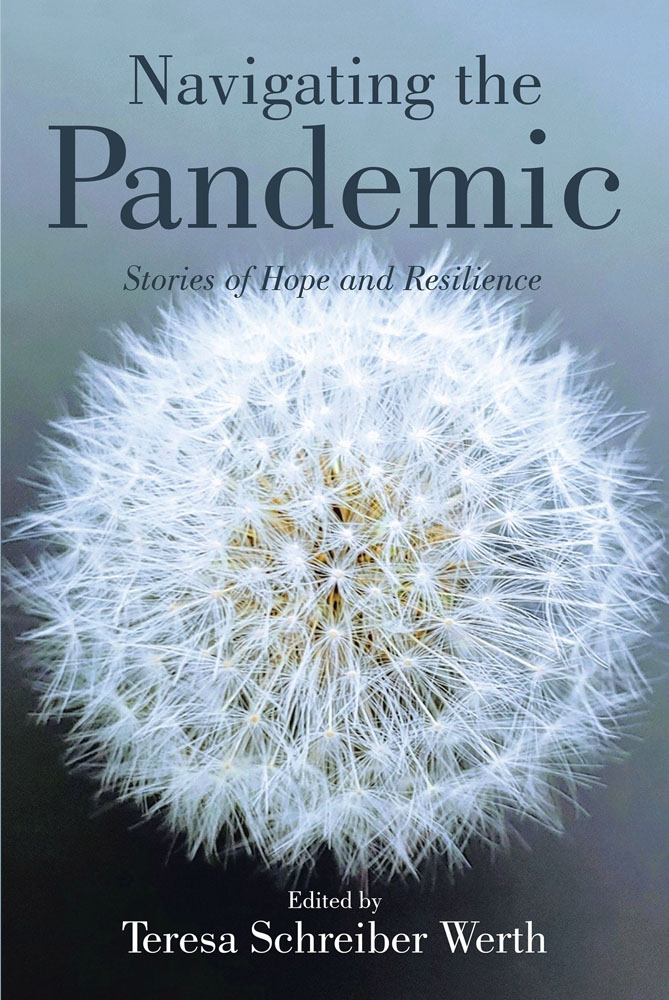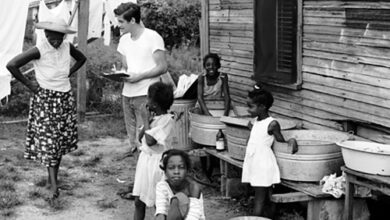Spencerport writer compiles book of essays on Navigating the Pandemic

by Miriam Ganze
Perhaps because she was born a Schreiber (German for writer), long time Spencerport native, Teresa Schreiber Werth seems to always turn to the written word during monumental moments in her life. Previously, she composed Poems for a Pregnant Lady, Coming Another: More Poems for a Pregnant Lady, In A Woman’s Voice, and most poignantly, Pink-On-Pink: Writing My Way Through Breast Cancer.
It should come, then, as no surprise, that Ms. Werth would deem a collection of essays on coping with the uncertainty, the disruption, the impotence, and the sorrow of 2020 as a “balm to soothe weary souls.” As a Certified Funeral Celebrant, she has spent many days and nights showing others a way through grief, but now she has turned to fellow writers and artists to create a kaleidoscope of perspectives and personal experiences to reassure her readers that they are not alone.
In Navigating the Pandemic: Stories of Hope and Resilience, Ms. Werth has brought together an eclectic group of poets, writers, photographers, artists, and musicians who offer personal perspectives on our historic year. There are 38 contributors in total, including 15 Rochester-area writers – Lynn Acquafondata, Joyce Arnold, Aylannie Campbell, Virginia Cross, Steve McAlpin, Gloria Osborne, Ida Perez, Maria Delgado Sutton, Jim Sutton, Dave Seaburn, Marj Smith, Gretchen Volk, Gordon Webster, and Camryn Zeitvogel. The contributors span the ages from high school seniors to retirees, the professions from medicine, to music, to clergy, and from an incarcerated person to a Fellow of the British Royal Society. They generously share their personal stories and reflections as a guide through this uncertain journey and any others that may lie ahead.
“As time went on and the book did not come out, I worried that the pandemic would be over and our book would lose its relevance,” Ms. Werth said. “But now it’s quite the opposite: more people than ever are experiencing more and more layers of loss, which feels like grief. None of us have been here before. We are lost. Our book offers direction, inspiration from personal and professional experiences and real hope, as we navigate this history we are living.”
As a keeper of a “100-acre worry farm” myself, I found the selections in this book comforting, consoling, and insightful. Not all the contributors are professionals, but all their messages are delivered with honesty and understanding. Some of the selections made me chuckle like rapper, Guy Banks (Tron), who tells us: “Laughter eases the fear/ Patience and open ears are necessary.”
His words resonate in the poem of Adam Lazarus, “The New Corona Virus Rules” with an April Fools rhyme that includes: “Hoard toilet paper? You’re on a ‘checkup’ list/ Performed by a shaky blind Proctologist.”
Ms. Werth weighs in with an essay on amusing cartoons, which include this lament: “To go to the grocery store, they said masks and gloves were enough. They lied. Everyone else had clothes on.”
Other essays I read through tears, but all of them touched my heart.
Health care professional Andrew Penn teaches about “ambiguous loss,” the sorrow “over things that are uncertain and incomplete.” Then he gently shows how to gain a measure of control. Many involved in health care, both professional and volunteers, speak movingly of falling in love with their dying patients, and paradoxically, of the heartbreak and comfort they found holding the hands of dying patients.
Other contributors deal with the persistent pandemics many of our brothers and sisters have lived through all their lives. J. Dawn Knickerbocker, an Ojibwa woman, reminds readers that “plagues” are no stranger to Native Nations. Ever since the arrival of the Europeans in their lands, Native peoples have suffered disproportionately, from the smallpox blankets of history to the lack of equitable health care today. Yet they continually persist. The lessons learned from their ancestors, placed in their bones, taught them perseverance. For the Ojibwa (and all the rest of us) there are only “two lasting sicknesses; being unprepared and being in anguish alone.”
Aylannie Campbell, a Black 2020 graduate of Spencerport High School, is no stranger to being in anguish alone. She recalls the isolation she lived with as the only Black child in her elementary classroom. Other students used racial slurs, which not only she, but her teachers pretended not to hear. This pandemic year is not just about COVID-19; it has magnified the contagion of racism borne by minority communities since 1609. Still, Ms. Campbell has inherited the bones of perseverance from her ancestors, and with that inner strength, she became a leader in a movement of inclusion and diversity in her high school and her town.
With a different perspective, second-grade teacher Penny Sue Williams McGanty details the struggles of teaching in the era of Zoom school. With her colleagues, she battled the technology needed to conduct class from home for 18 second-graders. As she puts it, “if tears were pounds,” today she would be a size six. Love and unity brought her through. After the 2020 spring break, one little boy told the class his dog had died that week. Ms. McGanty writes, “I could feel the love (his classmates) shared and how much we were together, but alone.”
Poet Ayanna Woods continues this motif by offering words of promise in dark times:
“They say it’s a lost cause
They haven’t seen the new roots
Weaving through the dark
When they cut off a branch that they say is dying?
It takes uncommon faith to grow.”
Although most contributors see hope in some level of unity, be it in laughter, tears, understanding, or stubborn persistence, Damian Barr asserts that, actually, we are not all in the same boat in this particular crisis. He believes we are all on different ships navigating our own particular “storm.”
The coronavirus will eventually stop dominating the news, but if we have learned nothing else from this year, everyone surely knows none of us can escape the inevitable rocky seas of life. These personal stories, poems, photographs, and artwork create a compass for coping with the “slings and arrows that flesh is heir to.” Do keep this book with your life jackets. Others have found their way to make it to shore, and in our own way, we can, too.
More information about Navigating the Pandemic: Stories of Hope and Resilience and it contributors can be found at www.dandelionbook.com. Profits from the sale of this book will be donated to The Society of Refugee Healthcare Providers, serving the medical needs of refugees and asylum seekers worldwide. The book is available locally through Lift Bridge Book Shop in Brockport.
Miriam Ganze is a retired Adjunct Associate
Professor at MCC where she taught
English to Speakers of Other Languages.


